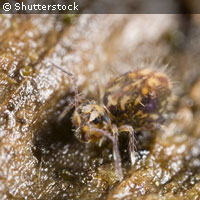Soil contamination test improved with worms
A Dutch researcher has discovered that exposing soil and sediment invertebrates like worms and springtails to toxic chemicals can give a more accurate test of soil contamination. Dr Miriam León Paumen of the University of Amsterdam also found that prolonged exposure can have a significant impact on the lifecycle of these invertebrates. Her findings give weight to the theory that gradual effects cannot be assumed in risk assessments for soil and sediment contamination. Dr Paumen exposed several invertebrates to toxic Polycyclic Aromatic Compounds (PACs) and found that the PACs had 'large and unpredictable effects' on the lifecycle of the species. PACs are a group of chemicals found in mineral oils and tars, among others, and are generated during the partial burning of fossil fuels and oil products. Experts say the environment is home to many PACs, which the EU has decreed as 'priority toxic substances'. The funding body Netherlands Organisation for Scientific Research (NWO) said: 'These chronic effects can vary from the effects of short-term exposure to PACs.' According to the NWO, the findings show that soil and sediment contamination tests are more reliable when they are backed by the effects of prolonged exposure of soil and sediment fauna to toxic substances. The effects of PACs on terrestrial and benthic (species living at the bottom of a body of water) invertebrates is used to calculate the risks of soil and sediment contamination. Dr Paumen assessed the effects of two 'standard' (i.e. conventional) and four 'new' (i.e. non-conventional) PACs on one or more generations of terrestrial and aquatic invertebrates: two species of worm, a springtail (a small insect found in soil) and a chironomid (a non-biting midge found near water) species. By exposing the invertebrates to PACs in lifecycle tests, the researcher found highly predictable effects on the species' development in 70% of the cases; specifically, she observed highly predictable arrested development. The species were subjected to the influence of artificially PAC-contaminated soil and sediment. According to the NWO, extensive and unpredictable effects on the lifecycle frequently emerge because of prolonged exposure, in particular from the new PACs. A multigenerational experiment also showed that the influence of these toxic PACs over a number of generations is unpredictable. 'The usual concentration-response relationships changed into an all-or-nothing response with a clear threshold value [i.e. a clear turning point],' NWO said. '[Dr] Paumen has now demonstrated that the effects of prolonged exposure can be very different and so risk assessments based on such measurements are more accurate,' the NWO said, adding that her research 'has provided opportunities to improve the accuracy of risk assessments'. A Dutch-based company has already applied some of the new techniques at contaminated locations. Also participating in the study were the National Institute of Public Health and the Environment (RIVM) in the Netherlands and the crude oil industry because of the significance of PACs in crude oil and its combustion products.
Countries
Netherlands



